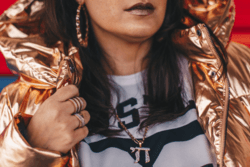Checked Boxes
“You check a lot of boxes.”
We were standing around during a break at the Rising Voices Fellowship retreat run by JWA. The other girls and I had just done an exercise where we stood by photos that spoke to us about Jewish women’s history. I couldn’t choose between a photo of women holding a banner during a march that said “Jewish Women of Color” and another protest photo with women holding a sign that said “Jewish lesbians against antisemitism and racism.” I was explaining to the other girls my inner conflict. I ended up choosing the “Jewish Women of Color” photo, because I was one of two people of color in the room. As I explained the pull I felt towards both photos, I realized I was one of the only ones to relate to either photo. In fact, I was the only one to relate to both. That’s when another girl said to me that I “check a lot of boxes.” She’s not wrong. She also isn’t the only one to have ever said so.
In stressful conversations with my friends about college, contemplating and complaining about our futures, I’ve been told that I’ll be “fine.” I’ve been told that, because I’m not white and because I’m queer, I don’t have to stress about college applications. It’s invalidating to hear my existence boiled down to a few lines on a piece of paper, to hear that the boxes I check and not my merit alone are what will be credited if I get into a good college. Moreover, my friends who are white or of other majority groups realize little how similar our experiences of the world actually are.
I have a lot of intersecting identities, mostly with typically marginalized groups. I’m a queer, Filipino-American, Jewish girl. It’s a lot, I know. It wouldn’t be much of a hyperbole to claim that I belong to more marginalized groups than many of my peers. However, regardless of these identities, I have a lot of privilege and I haven’t experienced much of the oppression faced by many of these groups. I experience a complex combination of both discrimination and privilege due to my identity.
Even though I am a person of color, I have a white father. I am biracial, and I’m light-skinned and racially ambiguous. Because of these features, I’m stereotyped less often than other POC. It’s not as easy for my peers to label me with cultural stereotypes when they are unsure of what culture I belong to. My light skin and somewhat European features mean that I fit into the Western beauty standard more than some other people of color. I have never been called a racial slur, nor do I often fear that I will be stereotyped as a criminal or terrorist due to my features and skin color.
My light skin isn’t all that I inherited from my white father; I have also benefited from the class privilege accumulated by his past generations. I belong to the upper middle class. My father and his entire immediate family had quality education and earned graduate degrees, permitted to them because of their skin color. I, in turn, benefited from a private education for four years. People of color in America have experienced oppression through systematic economic control. I don’t face much of this oppression because of my socioeconomic status.
I don’t explicitly present as queer. I don’t present as butch. I have long hair and feminine features. People don’t necessarily assume I like women. Because I’ve never dated, I haven’t experienced explicit discrimination for dating someone of the same sex. In turn, I don’t face much of the discrimination that many other queer people face because people don’t perceive me as being queer. I haven’t experienced being outed in the way many people are. I feel comfortable being open about my sexual orientation.
I also don’t present as Jewish. While there isn’t a specific way a Jewish person should look, I don’t fit into the cultural stereotypes of white skin and curly dark hair. People are often taken aback when I tell them I’m Jewish. I've encountered puzzled looks many times followed by the statement, “You don’t look Jewish.” As with my queer identity, this means I don’t face many of the stereotypes or discrimination that many Jewish people face. I check the box without people knowing I check it. I am rarely a target for antisemitism simply because people don’t think I am Jewish.
Yet, the reason that I have not necessarily experienced the same oppression many people with my marginalized identities face is frustrating in its own way. Much of the reason I don’t face discrimination is because of the cultural stereotypes themselves that say I don’t fit into the marginalized group. Because Jewish, queer, and non-white people are “supposed” to look a certain way, I am, in turn, made to feel out of place. While I may have the privilege to avoid much of the discrimination targeted at the minority groups I identify with, my intersectional identities cause a discrimination of its own kind. Brown people aren’t Jewish. Jewish people aren’t queer. The list goes on. The irony that my intersectional identities both prevent and cause discrimination is poignant. While I still am exploring the ways in which I experience both privilege and discrimination, it’s for me and only me to explore, not for others to assume based on the way I present and express myself. The discrimination I face is complex and is more than meets the eye. The way I interact with the world and the privilege I have is more than a box I check on a college application.
This piece was written as part of JWA’s Rising Voices Fellowship.







This is a great analysis of intersection identity. Thank you for sharing!